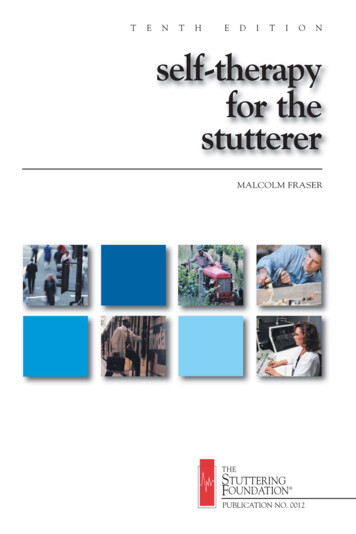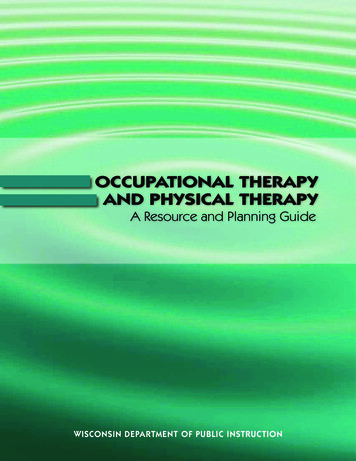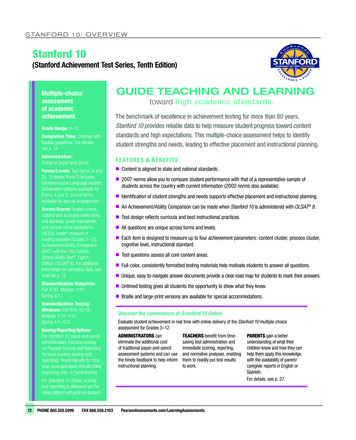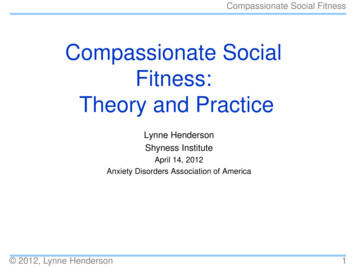
Transcription
TENTHEDITIONself-therapyfor thestuttererMALCOLM FRASERTHESTUTTERINGFOUNDATION PUBLICATION NO. 0012
This bookhas been provided in partthrough the generosityof theGenuine Parts CompanyTHESTUTTERINGFOUNDATION姞A Nonprofit OrganizationSince 1947—Helping Those Who Stutter
T E N T HE D I T I O Nself-therapyfor thestuttererByMalcolm Fraser, L.H.D.Life MemberAmerican Speech-Language-Hearing AssociationFounderStuttering Foundation of AmericaTHESTUTTERINGFOUNDATION PUBLICATION NO. 0012
self-therapy for the stuttererPublication No. 0012First Edition—1978Tenth Edition—2002Revised Tenth Edition—2007Published byStuttering Foundation of America3100 Walnut Grove Road, Suite 603P.O. Box 11749Memphis, Tennessee 38111-0749Library of Congress Catalog Card No. 00-133443ISBN 0-933388-45-4Copyright 2007, 2004, 2002, 2000, 1993, 1978 byStuttering Foundation of AmericaThe Stuttering Foundation of America is a nonprofitcharitable organization dedicated to the preventionand treatment of stuttering. Contributions are taxdeductible.Printed in the United States of America.
Dedicated to allwho seek relief from the burdenof stuttering.
To the ReaderThere are always some stutterers who are unableto get professional help and others who do not seem tobe able to profit from it. There are some who prefer tobe their own therapists. In this book, Malcolm Fraser,Founder of the Stuttering Foundation of America, hasprovided some guidance for those who must helpthemselves. Knowing well from his own experience as astutterer the difficulties of self-therapy, he outlines aseries of objectives and challenges that should serve asa map for the person who is lost in the dismal swamp ofstuttering and wants to find a way out.CHARLES VAN RIPERDistinguished Professor Emeritus and formerlyHead, Department of Speech Pathology andAudiology, Western Michigan University
“The stutterer must conquer his ownproblems. No one else can do it for him.”—Van Riper6
ContentsUse the Index (page 189) for location of instructiveinformation concerning all phases of stutteringOn Self-Therapy . . . . . . . . . . . . . . . . . . . . . . . . . . . . . . . . . . . . . . . 11On This Approach to Self-Therapy . . . . . . . . . . . . . . . . . . . . . . . . 13Original Cause of Your Stuttering . . . . . . . . . . . . . . . . . . . . . . 18Factors Affecting Therapy . . . . . . . . . . . . . . . . . . . . . . . . . . . . . . . 19Your Feelings and Emotions . . . . . . . . . . . . . . . . . . . . . . . . . . . 19Tension and Relaxation . . . . . . . . . . . . . . . . . . . . . . . . . . . . . . . 21Distractions . . . . . . . . . . . . . . . . . . . . . . . . . . . . . . . . . . . . . . . . . 24Enlisting the Support of Others . . . . . . . . . . . . . . . . . . . . . . . . 25Your Determination . . . . . . . . . . . . . . . . . . . . . . . . . . . . . . . . . . 27The Premise and The Program . . . . . . . . . . . . . . . . . . . . . . . . . . . 29A Helpful Therapy Procedure . . . . . . . . . . . . . . . . . . . . . . . . . . . . 33The All Important Ground Rules . . . . . . . . . . . . . . . . . . . . . . 37–60Talking Slowly and Deliberately . . . . . . . . . . . . . . . . . . . . . 41, 61Stuttering Easily . . . . . . . . . . . . . . . . . . . . . . . . . . . . . . . . . 42, 65Admitting That You Stutter . . . . . . . . . . . . . . . . . . . . . . . . 43, 69Eliminating Secondary Symptoms . . . . . . . . . . . . . . . . . . . 45, 80Eliminating All Avoidances . . . . . . . . . . . . . . . . . . . . . . . . . 46, 85Maintaining Eye Contact . . . . . . . . . . . . . . . . . . . . . . . . . . . 48, 95Finding Out What You Do When You Stutter . . . . . . . . . . 49, 99Using Block Corrections . . . . . . . . . . . . . . . . . . . . . . . . . . . 51, 113Moving Forward As You Speak . . . . . . . . . . . . . . . . . . . . . . . . . 52Using Inflection . . . . . . . . . . . . . . . . . . . . . . . . . . . . . . . . . . . . . 53Listening to Your Fluent Speech . . . . . . . . . . . . . . . . . . . . . . . . 53Talking All You Can . . . . . . . . . . . . . . . . . . . . . . . . . . . . . . . . . . 54Goals and Challenges . . . . . . . . . . . . . . . . . . . . . . . . . . . . . . . . . . 55Develop Heirarchy . . . . . . . . . . . . . . . . . . . . . . . . . . . . . . . . . . . .55Set Up a Daily Quota . . . . . . . . . . . . . . . . . . . . . . . . . . . . . . . . . .57Minimum and Maximum Goals . . . . . . . . . . . . . . . . . . . . . . . . .57Sample Chart . . . . . . . . . . . . . . . . . . . . . . . . . . . . . . . . . . . . . . . .58Rewards . . . . . . . . . . . . . . . . . . . . . . . . . . . . . . . . . . . . . . . . . . . . .59Desirable Equipment . . . . . . . . . . . . . . . . . . . . . . . . . . . . . . . . . .59Voluntary Stuttering . . . . . . . . . . . . . . . . . . . . . . . . . . . . . . . . . . . 72Using The Telephone . . . . . . . . . . . . . . . . . . . . . . . . . . . . . . . . . 91Analyzing Blocks . . . . . . . . . . . . . . . . . . . . . . . . . . . . . . 101 and 107Block Corrections . . . . . . . . . . . . . . . . . . . . . . . . . . . . . . . . . . . . . 113Post-Block Correction . . . . . . . . . . . . . . . . . . . . . . . . . . . . . . . . 115In-Block Correction . . . . . . . . . . . . . . . . . . . . . . . . . . . . . . . . . 121Pre-Block Correction . . . . . . . . . . . . . . . . . . . . . . . . . . . . . . . . 123Do You Get Discouraged? . . . . . . . . . . . . . . . . . . . . . . . . . . . . . . . 129Let’s Review, What’s Been Done . . . . . . . . . . . . . . . . . . . . . . . . . 133Where Are You—Conclusion . . . . . . . . . . . . . . . . . . . . . . . . . . . . 137A Personal Letter To You . . . . . . . . . . . . . . . . . . . . . . . . . . . . . . . .141Appendix . . . . . . . . . . . . . . . . . . . . . . . . . . . . . . . . . . . . . . . . . . . . 143Support Groups—Sharing With Others . . . . . . . . . . . . . . . . . . . 144The Effect of Fear . . . . . . . . . . . . . . . . . . . . . . . . . . . . . . . . . . . . . .145On Breath Control . . . . . . . . . . . . . . . . . . . . . . . . . . . . . . . . . . . . 146Electronic Devices . . . . . . . . . . . . . . . . . . . . . . . . . . . . . . . . . . . . 147Using The Phone . . . . . . . . . . . . . . . . . . . . . . . . . . . . . . . . . . . . . 148Eliminating Stereotypes . . . . . . . . . . . . . . . . . . . . . . . . . . . . . . . 151Relevant and Interesting Quotations . . . . . . . . . . . . . . . . . . . . . 152Glossary . . . . . . . . . . . . . . . . . . . . . . . . . . . . . . . . . . . . . . . . . . . . 171Authors of Quotations . . . . . . . . . . . . . . . . . . . . . . . . . . . . . . . . . 186Index . . . . . . . . . . . . . . . . . . . . . . . . . . . . . . . . . . . . . . . . . . . . . . . 189
The person who stutters in this book is oftenreferred to as “he” or “him.” This is done foreditorial reasons but may be considered as fairlyrepresentative since it is estimated that 3 to 4 timesas many males stutter as females.8
The quotations and footnotes in this bookhave been taken from the writings of speechlanguage pathologists and medical doctors.All of them have earned degrees as doctors ofphilosophy or medicine and know what youare up against as most stutter themselves.They understand your problem from observation and experience and represent a mostdistinguished array of authority and prestige in the field of stuttering. Their namesand titles are listed starting on page 186.Those who stutter are marked with a star bytheir name.9
“The importance of motivation cannot beexaggerated, and success or failure oftherapy will depend on your commitmentto follow through.”In case you are not familiar with the meanings of some of the words used in this book, youwill find a glossary beginning on page 171 wheredefinitions are given of terms and expressionsused in the treatment of stuttering includingmany not found in this book. Read them for yourgeneral education in speech pathology.10
On Self-TherapyIf you are like many of the three million stutterers in thiscountry, adequate clinical treatment will not be available toyou. Whatever you do you’ll have to be pretty much on yourown with what ideas and resources you can use. (Sheehan)The first thing you must do is to admit to yourselfthat you need to change, that you really want to do something about the way you presently talk. This is tough butyour commitment must be total; not even a small part ofyou must hold back. Don’t dwell longingly on your fluencyin the magical belief that some day your speech blocks willdisappear. There is no magic potion, no pink pill that willcure stuttering.Don’t sit around waiting for the right time for inspiration to come to you—you must go to it. You must see thatthe old solutions, the things you have done to help yourselfover the years simply do not work. Ruts wear deep though,and you will find it difficult to change. Even though theway you presently talk is not particularly pleasant, it isfamiliar. It is the unknown from which we shrink.You must be willing to endure temporary discomfort,perhaps even agony, for the long range improvement youdesire. No one is promising you a rose garden. Why nottake the time and effort now for a lifetime of freedom fromyour tangled tongue? How can you do this? Break down theglobal problem of stuttering into its parts and then solvethem one at a time. No one said it was easy. Shall we begin?(Emerick)A valuable precondition for a successful therapy is thedeep inner conviction of the stutterer in the manageabilityof his disorder, combined with a fighting spirit and a readiness to undergo hardships and deprivations if needed—hopelessness, pessimism and passivity being the deadliestfoes to self-improvement.(Freund)11
“There is no quick and easy way totackle stuttering, but with the rightapproach, self-therapy can beeffective.”12
On This Approach to Self-TherapyThis book is written to and for the many adultsand teenagers who stutter 1,3—and is addressed in thesecond person to describe what you can and should do tocontrol your stuttering. We state confidently that as a stutterer, you do not need to surrender helplessly to yourspeech difficulty because you can change the way you talk.You can learn to communicate with ease rather than witheffort. There is no quick and easy way to tackle stuttering,but with the right approach, self-therapy can be effective.Experience may have caused you to be skeptical aboutany plan which claims to offer a solution. You may havetried different treatment ideas and been disappointedand disillusioned in the past. This book promises noquick magical cure and makes no false claims.2It describes what you can and should do to build selfconfidence and overcome your difficulty.It offers a logical practical program of therapy based onmethods and procedures that have been used successfullyin many universities and other speech clinics. Thisapproach to therapy has been shown to get results.3If there were an easier or better way of learning how tocontrol stuttering, we would recommend it.1Almost one percent of the population of this country manifest someacute form of stuttering speech, which places them under a great economicand social handicap. This can be corrected if given the proper training.(Martin)2There are no quick or magical answers to your stuttering. (Barbara)3This book has been translated into 12 foreign languages: German,French, Spanish, Japanese, Lithuanian, Finnish, Slovakian, Danish,Russian, Czech, Zulu, and Chinese.13
On This Approach to Self-TherapyWe start with two assumptions. One is that you have nophysical defect or impairment of your speech mechanismthat will get in the way of your achieving morefluent speech. After all, you can probably talk without stuttering when you are alone or not being heard or observedby others.1,2 Practically all those who stutter have periods offluency, and most speak fluently part of the time.And we assumethat you may not be in“You are the only person on eartha position to availwho can correct your stuttering.”yourself of the servicesof a speech patholo—Starbuckgist, trained to helpyou work on yourproblem in the manner described in this book and that, as aresult, you need to be your own therapist. Even with competent guidance, authorities would agree that stutteringtherapy is largely a do-it-yourself project anyway.3,4,5,6If you are sincerely interested in working on yourspeech, you will need to have a strong motivation to overcome your difficulty and a sincere determination to followthrough on the suggested procedures and assignments.1There is nothing wrong inside your body that will stop you from talking.You have the ability to talk normally. (D. Williams)2Because you stutter doesn’t mean you are biologically inferior to thenext person. (Sheehan)3No one but myself improved my speech. Others have helped me by providing information, giving emotional support, identifying bias, etc. but thedirty work of therapy is, and always has been, my responsibility. (Boehmler)4Don’t ever forget that even if you went to the most knowledgeable expertin the country, the correction of stuttering is a do-it-yourself project.Stuttering is your problem. The expert can tell you what to do and how to doit, but you are the one who has to do it. You are the only person on earth whocan correct your stuttering. (Starbuck)5The stutterer must conquer his own problems—no one else can do thejob for him. (Van Riper)6Needless to say, each stutterer must from the beginning of therapyaccept the responsibility for his problem. This implies self-therapy which isessential. (Stromsta)14
On This Approach to Self-TherapyThe importance of motivation cannot be exaggerated,and success or failure of therapy will depend on your commitment to follow through.1 It will not be easy, but it canbe done.On the other hand, there is no way to promise successin this or any other program since no sure ‘cure’ for stuttering has yet been discovered in spite of what you mayhave read.However, it is reasonable to believe that if you follow thesuggestions and carry out the procedures outlined in thisbook, you should be able to control your stuttering andspeak easily without abnormality. Others have conqueredtheir stuttering and you can too.But the best way foryou to judge the effectiveness of any therapy is totry it out and let theresults speak for themselves.2,3The importance of motivationcannot be exaggeratedIt should be mentioned that there are many differencesamong stutterers. Some cases are mild and others severe,and in most cases the frequency and severity of stutteringtends to vary from time to time and from one situation toanother.Sometimes you may be able to speak in a comparatively fluent manner with little or no difficulty; at other timesyou may have considerable trouble, particularly when themessage to be conveyed is important. That tends to makeThe importance of motivation cannot be exaggerated. (Hulit)A major problem in the treatment of stuttering is how to encourage thestutterer to stay in and continue with the course of treatment. (Barbara)3Based on your understanding choose the most appropriate therapyprogram you can, and work at the program with more consistency, devotionand energy than any other task you’ve ever tackled. As success is obtained,maintain it with equal vigor. (Boehmler)1215
On This Approach to Self-Therapyit a most frustrating disorder since it can and usually doesbecome worse in certain environments and under certaincircumstances.Most stutterers are apt to have the most difficulty whenembarrassed and anticipating trouble.1 As one personexpressed it, “if you can’t afford to stutter, you will.”It may be morenoticeable when you are if you can’t afford to stutter,asked to state y o u ryou will.n a m e , w h e n talkingto people in authoritylike prospective employers, teachers, in making introductions, when speaking togroups or talking on the telephone, etc. On the other hand,you may have little or no trouble when talking to yourself ortalking to a child or a pet animal.2It should also be recognized that stutterers vary widelyin their reactions and characteristics and in the conditionsunder which their stuttering occurs. No two persons stutter in the same manner since every stutterer has developed his own particular pattern of stuttering.3,4,5 All thosewho stutter have a wide variety of personality traits, soyour reactions may be different from others; and accordStuttering is an anticipatory struggle reaction. (Bloodstein)Some stutterers have difficulty reading aloud; others do not. Somecan speak well when in a position of authority; some show their greatestdifficulty here. Some can use the telephone without interference; others arecompletely frustrated by this situation. Speaking with members of theopposite sex causes great difficulty to one stutterer but results in fluencywith another. Some speak well at home but not in other environments; withothers the situation is completely reversed. (Ansberry)3The old saying that no two stutterers are alike is undoubtedly true.(Luper)4The speech behavior patterns that have usually been associated with oridentified as stuttering vary from person to person, and from time to timewith any given person. (D. Williams)5We all have different personalities and our pattern of stuttering isdistinct and interwoven in the unique personalities. (Garland)1216
On This Approach to Self-Therapyingly we ask you to bear with us when you read abouttroubles which you may not encounter yourself but whichmay represent a problem to others.Most have certain abilities which seem somewhatsurprising. Nearly all those who stutter generally havelittle or no difficulty when they sing, shout, whisper, orread in unison with others.1If you have no difficulty talking when you are alone orwhen you are reading or speaking in unison with others,that would indicate that you have the physical ability tospeak normally.Having the physical ability to speak normally wouldmake it evident that fear or anticipation of trouble or fearmay cause you to put unnecessary tension into yourspeech mechanism and that may trigger most of yourdifficulty.2In this connection, we would add that this in no wayinfers that any mental deficiency is involved since it isbelieved that the I.Q. (intelligence quotient) of the averagestutterer is normal or above normal.3,4,51Most stutterers have certain abilities which are somewhat surprising.Even the most severe stutterers generally have little or no difficulty whenthey sing, shout, whisper, speak to a rhythmic stimulus such as a metronome,speak or read in unison with another speaker or speak to a masking noise.(Ramig)2The field of stuttering should be recognized as a border area betweenpsychopathology and speech pathology but closer to the first of these.(Freund)3Because you stutter it doesn’t mean that you are any more maladjustedthan the next person. (Sheehan)4On the whole people that stutter are highly intelligent and capable.(Barbara)5Some famous people who stutter have been of above normal intelligence:Winston Churchill, Charles Darwin, Lewis Carroll, Jack Welch of GeneralElectric, actor James Earl Jones, etc.17
On This Approach to Self-TherapyOriginal Cause of Your StutteringMany stutterers have mistakenly believed that if onlythe “cause” could be found, a fast cure would result. Manytheories have been advanced to explain the nature andcauses of stuttering, but none of them has been proven atthis time.Considerable research is being carried out to investigate possible neurological involvement,1,2 dominance of onecerebral hemisphere over another, and any factors whichmay cause a lack of speech muscle coordination resultingin stuttering. Hereditary factors also play a role in somepeople who stutter.3Whatever the causeor causes, you need tobe concerned aboutwhat you are doing—Murraynow that perpetuatesand maintains yourdifficulty, not about what happened in the past. 4,5“Many have mistakenly believed thatif only the ‘cause’ could be found, afast cure would result.”There is no reason for you to spend the rest of your lifestuttering helplessly. You can gain confidence in yourability to communicate freely.Others have prevailed, and so can you.Recent evidence from brain imaging studies provides a coherent albeitpreliminary view that stuttering occurs when a neurophysiologic system.fails.(Watson)2Any differences between stuttering and non-stuttering speakersinvolve not only brain regions involved in motor planning and execution, butalso those areas important for processing of sensory feedback. (De Nil)2Inheritance clearly plays a role in some cases of stuttering. It is notknown what these genetic factors are or how they might act. However,ongoing studies of individuals in stuttering families may give us importantinformation about the causes of stuttering. (Drayna)3Many stutterers have mistakenly believed that if only the “cause”could be found, a fast cure would result. (Murray)4The underlying rationale for this program is that stuttering is aunique communication disorder of presently unknown origin or origins, andit cannot be cured. (Breitenfeldt)118
Factors Affecting TherapyBefore explaining the specific steps to be used in therapy,certain relevant factors should be discussed. This isbecause these factors can affect your attitude toward andyour ideas about treatment and how you can and shouldwork on it.These factors include information on subjects whichcan have a substantial influence on progress in therapy,factors such as1) feelings and emotions,2) tension and relaxation,3) distractions,4) enlisting help from others, and5) your determination or motivation.We will begin by pointing out how feelings and emotionscan and frequently do affect the severity of your difficulty.Your Feelings and EmotionsStuttering is no simple speech impediment. It is a complicated disorder which has both physical and emotionalaspects. To illustrate the latter, the statement can be madethat stuttering is largely what the stutterer does tryingnot to stutter.1 In other words, stuttering is like an incredible trick you play on yourself. As you tense in reaction toyour stuttering and your feelings about stuttering, you arelikely to stutter more.1In other words, stuttering is what you do trying not to stutter again.(Johnson)19
Your Feelings and EmotionsWhat happens is that you want to stop stuttering sobadly that, as a result, you try to force trouble-freespeech.1 And the more you force, the more tension is builtup in your speech mechanism and the more trouble youare apt to have. The mechanism of speech is so delicatelybalanced that the more you try to stop stuttering, theworse you unwittingly make it.Stuttering affects one emotionally since being astutterer can be rough. Possibly you may even think it’sa disgrace to be a stutterer even though that is not so. Asa result, you may have become extremely sensitive aboutyour difficulty.It is true that the experience of being blocked or notbeing able to say what you want to say without stutteringcan be really frustrating.2 As a result, under some circumstances you may become so embarrassed and humiliated that you suffer from feelings of helplessness, shame,inferiority, depression and sometimes self-hatred.3Your emotions may generate so much fear and anxieythat they can affect your attitude toward others and lifein general.4,5 Like the tail that wags the dog, stutteringcan alter your personality. If you can become desensitized and learn that you do not have to panic when you1The stutterer attempts to force the articulation of his words and speakingnow becomes a muscular rather than a mental process. (Bluemel)2Fluency is a fair-weather friend that deserts the stutterer when heneeds it most. (Sheehan)3Talking was a highly emotional experience which gave me a feeling ofhelplessness, failure and defeat. (Freund)4The stutterer develops emotional reactions which permeate his verysoul, affect his will and upset his mind. (Martin)5The stutterer feels at most times apart and different from others in hissociety. He feels that although others also have difficulties in life, they can copewith them and live much more easily with their problems. He feels morepermanently crippled than others because of the fact that he cannot hide orconceal his speech difficulty, and therefore, he is on the constant target of theirembarrassment, ridicule and disapproval. (Barbara)20
Tension and Relaxtionstutter or anticipatestuttering, then youcan begin to changethe way you talk; andprogress will comemore swiftly.Positive changes in attitudes andfeelings about yourself and yourstuttering will lead to positivechanges in your speech.Positive changesin attitudes and feelings about yourself and your stuttering will lead to postive changes in your speech.Stuttering fears can be of words or sounds, or somepersons, of certain situations, of the telephone, of sayingyour name, of a job interview, etc. When you have littlefear, you have less tension and probably will not have asmuch difficulty.When your fear is strong, it builds up tension in yourspeech mechanism and you will stutter more frequentlyand severely. Sometimes this fear can be so strong as tomake you frantic and almost paralyze thought and action.Such fear or anxiety may prevent you from enteringsituations and experiences that you would otherwise enjoy.This may cause more shame and embarrassment, and themore frustrated you become, the more you are likely tostutter.As one person expressed it, “If you can’t afford to stutter, you will.” So your stuttering is usually in proportion tothe amount of fear you have.1Tension and RelaxationSince fear builds up excessive muscular tension, itsreduction should be a major goal of therapy. Tension, gen1The more one stutters, the more he fears certain words andsituations. The more he fears the more he stutters. The more he stutters theharder he struggles. The more he struggles, the more penalties he receives,and the greater becomes his fear. (Van Riper)21
Tension and Relaxationerated by fear, plays a most important part in activatingyour stuttering and may be the immediate triggeringcause of your difficulty.1,2,3 If you didn’t try to force troublefree speech, you wouldn’t stutter as much or at least youwould stutter more easily.How can tension be reduced? That’s difficult to answer. Ithas been suggested that hypnotism might help. It would bewonderful if you could reduce or eliminate your tension bygetting some sort of hypnotic treatment, but unfortunately,hypnosis has not been shown to have any permanent effect.4In an effort to relax, many stutterers have experimented with drinking alcoholic beverages or gettingslightly intoxicated. Although this may result in stuttering changes for some people, the effect is only temporary.Obviously, it cannot be recommended.5,6Although there are new drugs, which work to reducefear and anxiety, unfortunately there are no drugsapproved specifically for stuttering at this time.7,81Crucial to this point is the fact that struggle and avoidance worsen aproblem of stuttering. (Moses)2Stuttering results when the speaker is unable to cope with excess muscular tension in the speech mechanism. (Luper)3Stuttering then may be considered to be in large part something peopledo when they become unusually tense about the way they talk. (Bloodstein)4Many of you have heard about the wonders of hypnosis and may lookto this technique to provide a quick answer. Rest assured that this has beentried throughout the years, but almost invariably with only temporary andfleeting success. (Murray)5I turned to smoking excessively and drinking occasionally but found nosolace there. (Wedberg)6One of my patients was a city official who made a practice of takingwhisky before giving his weekly report to the City Council. Soon his alcoholism became a more serious problem than his stammering, and he washospitalized for this condition. (Bluemel)7Since the exacerbation of stuttering by anxiety is a common experience,it might be assumed that drugs that relieve anxiety would be beneficial.(Rosenberger)8Even though medications for stuttering may be on the horizon, no formof therapy for stuttering is a cure. Therefore, future treatment will likelyinvolve the combination of medication with speech therapy to achive the optimal results. (Maguire)Editor’s note: As we go to press, clinical trials are being conducted on the drug pagoclone foruse specifically for stuttering.22
Tension and RelaxationMoreover, in many cases, drugs may bring their own set ofside effects to the problem.It has also been suggested that relaxation exerciseshelp to reduce or eliminate the tension that you experience. It would be good if you could practice relaxationprocedures that would eliminate tension and retaintheir effectiveness during moments of stuttering.Much research has gone into studying this subject,and many people who stutter have spent thousands ofhours trying out such procedures in the hope that theireffect would carry over to their time of need. However,the results have not proved satisfactory.1Learning to relax can always benefit your speech,general health, and well-being even if it is not indicatedas a solution to the problem. The fundamental principleholds that the more calm and relaxed you are, the lessstuttering you will do.2 That’s one reason you will beasked to talk in a smooth, slow, easy and deliberatemanner as it will help to induce a calmer and morerelaxed way of speaking.More practical than general relaxation is the relaxationof specific muscles. When you can locate the place wherethe most tension is, it is possible for you to learn to relaxthose muscles during speech.3 This will be particularlyhelpful.These exercises involve only certain muscles, the onesyou use to control your lips, your tongue, your mouth,1Relaxation has sometimes been described as a method in and of itselffor the treatment of stuttering. I do not believe, however
provided some guidance for those who must help themselves. Knowing well from his own experience as a stutterer the difficulties of self-therapy, he outlines a series of objectives and challenges that should serve as a map for the person who is lost in the dismal swamp of










